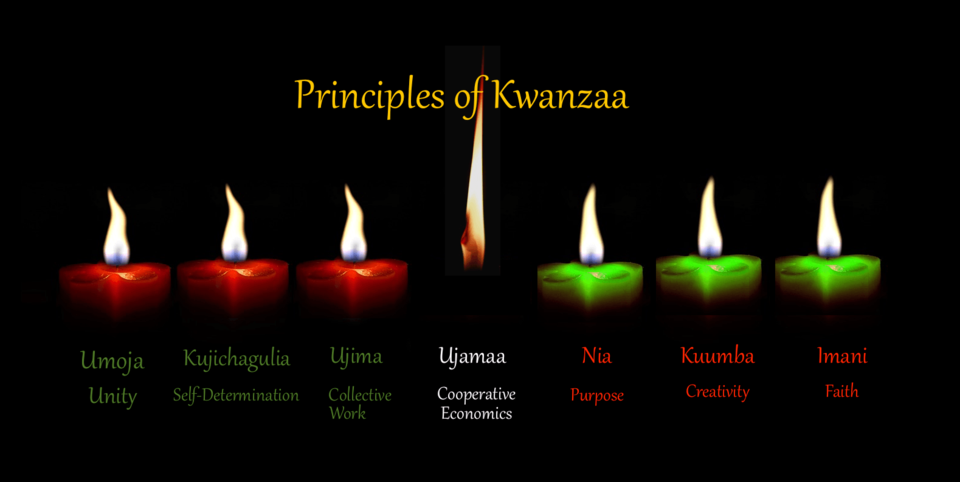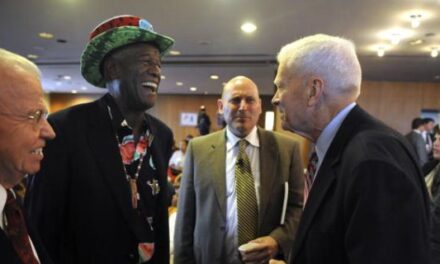
Like
Like Love Haha Wow Sad Angry
1
(ThyBlackMan.com) This is a revisiting of an early and ongoing conversation about the shared meaning of Kwanzaa, its particular cultural message to African people, and its core values that speak to the best of what it means to be African and human in the world and for the world. It raises the constantly relevant issues of race and religion and how they relate, not only to Kwanzaa as a holiday, but also to us as a people.
Each year the coming of Kwanzaa brings a sense of joyful satisfaction of having created something unique, beautiful, and beneficial for our people. It also reminds me of the extensive and enjoyable research, study and thought I pursued to conceive and create Kwanzaa, and the overall and ongoing labor of love offered to make Kwanzaa a living, lasting and transformative tradition worthy of the name, history, and culture African. As an activist-scholar, I sought to build into Kwanzaa’s Kawaida philosophical framework answers to questions that would be raised, not only about the daily practice and values of Kwanzaa, but also about its origins and intent, its relation to religious and other holidays, and our self-conscious insistence on the special and particular meaning and message it has for us as African people.

I think too of how millions of African people all over the world have embraced and celebrate this pan-African holiday, Kwanzaa, and how Kwanzaa unites us in ways no other holiday does. And I think of how it reaffirms our identity, dignity and excellence as African people, grounds us in our culture and provides us with a value system in the Nguzo Saba (The Seven Principles) which serves as framework and foundation for our internal strengthening and flourishing and our bringing good into the world. These are Umoja (Unity), Kujichagulia (Self-Determination), Ujima (Collective Work and Responsibility), Ujamaa (Cooperative Economics), Nia (Purpose), Kuumba (Creativity), and Imani (Faith).
Given the phenomenal growth and solid grounding Kwanzaa has achieved in the world African community, it’s no wonder claimants and controversies rise around it. Indeed, if it had remained a small organizational holiday as in its first years, no one would think it worthy of either claim or comment. For success always has numerous fraudulent fathers and pretentious mothers, but failure is almost always an orphan. Thus, there is an increasing parade of pretentious contributors to Kwanzaa’s conception, revisionist “histories” claiming discoveries of new authors and collective origins of its creation, and a persistent stream of right-wing, left-wing and liberal criticism around contrived issues of race and religion.
The first problem of quaint and curious claims of creating Kwanzaa is easily solved by testing the claimants for evidence of competence in African cultures and languages relevant to the conception of Kwanzaa, for indications of relevant research and associated intellectual activity, and for demonstration of continued contribution beyond anecdotal references and imagined assistance in wishful ways. The second reconception and misrepresentation of Kwanzaa poses a more serious problem. For it seeks to interrupt Kwanzaa’s continuing expansion, undermine its acceptance, and question and deny the right of Black people to celebrate themselves, embrace their own culture and have their own holiday without needing to explain away themselves or deny the special and particular meaning the holiday holds for them. And the criticism is posed in racial and religious terms to appeal to emotion and render reason almost irrelevant.
The issues of race and racism are raised around the strange and confused contention that Kwanzaa is too Black and we are being too Black by insisting on its Africanness, its Blackness and its particular meaning for Black people. Moreover, it is asserted that Kwanzaa and Black people must be less Black, if we are to be accepted and acceptable in the dominant society. Now, it should be noted that there is no public parallel conversation like this for others; no calls for Jews or Hanukkah to be less Jewish, or for the Irish and St. Patrick’s Day to be less Irish. Indeed, no other people are criticized for being too much of themselves or called separatist for having and celebrating a holiday that has a special and particular message and meaning for them, regardless of its meaning to others.
Yet there is among some a racial uncomfortableness about Black and Kwanzaa and thus, attempts to discredit it or redefine it to make it socially “acceptable” like with Nana King and Nana Malcolm. One such attempt is to redefine and re-present Kwanzaa and them as universal and not particular to Africans, as if we can’t be both. Indeed, Kwanzaa is culturally particular, but its essential message is both culturally particular and universal in the human sense of the word. To say that it is culturally particular is to say that it is culturally rooted, rises out of a particular people’s history and culture, bears the imprint and content of that people’s ideas and values, and speaks to the people in a special and particularly meaningful way. Therefore, Cinco de Mayo speaks to Mexicans in a particularly meaningful way; Chinese New Year to Chinese; Hanukkah to Jews; and St. Patrick’s Day to the Irish. And no one asks these cultural groups to redefine their holidays to de-emphasize their origins, make them less Mexican, Chinese, Jewish or Irish or redefine them so that they lose their particular historical and cultural meaning. And likewise, no one should ask that Kwanzaa be redefined and adulterated in such ways.
Kwanzaa is, of necessity, an African American and pan-African holiday and requires no permission or external acceptance for its practice, profound meaning or worth. Nor can it deny its special and particular meaning to African people without undermining its essential message and meaning as a celebration of African family, community and culture and a unique contribution to the diverse richness of human life and culture. And because Kwanzaa builds on the best of African culture, its message, like all ethically-expansive and world-encompassing messages, has both a particular and universal meaning. It speaks first and foremost to us, originates from us and is an expression of the special cultural truth we speak to the world. And in this, it speaks not only to the best of what it means to be African, but also the best of what it means to be human and thus offers a common-ground message to other humans in the world.
Therefore, religious resistance to Kwanzaa is also misplaced and is provoked and promoted by manipulation of uninformed apprehension and misunderstanding. There is no Kwanzaa competition or conflict with the various religions Black people embrace, for as we’ve said for years, Kwanzaa is a cultural holiday not a religious one. Kwanzaa builds on the best of African tradition and opens up cultural space for Africans of all faiths. And thus, Africans of all faiths can and do celebrate Kwanzaa: Black Christians, Muslims, Hebrews, Jews, Buddhists, Bahá’í, and Hindus, as well as those who follow the ancient African spiritual and ethical traditions of Maat, Ifa, Ashanti, Dogon, etc. For what Kwanzaa offers is not an alternative to their particular religions or faiths, but a common ground of African culture which they all share and on which they meet and are reaffirmed in the expansive meaning and sacred beauty of their being African in the world.
Thus, all over the world, African people rightfully celebrate Kwanzaa, embrace and find common ground in its cultural and ethical values, in its insistence on the oneness and sacredness of life, social justice, due respect of persons and people, responsibility and care for the vulnerable, repair and preservation of the environment, the end of oppression everywhere, a just peace, and the shared obligation to constantly bring and sustain good in the world through righteous and relentless struggle.
Written by Dr. Maulana Karenga
Official website; https://www.maulanakarenga.org/




